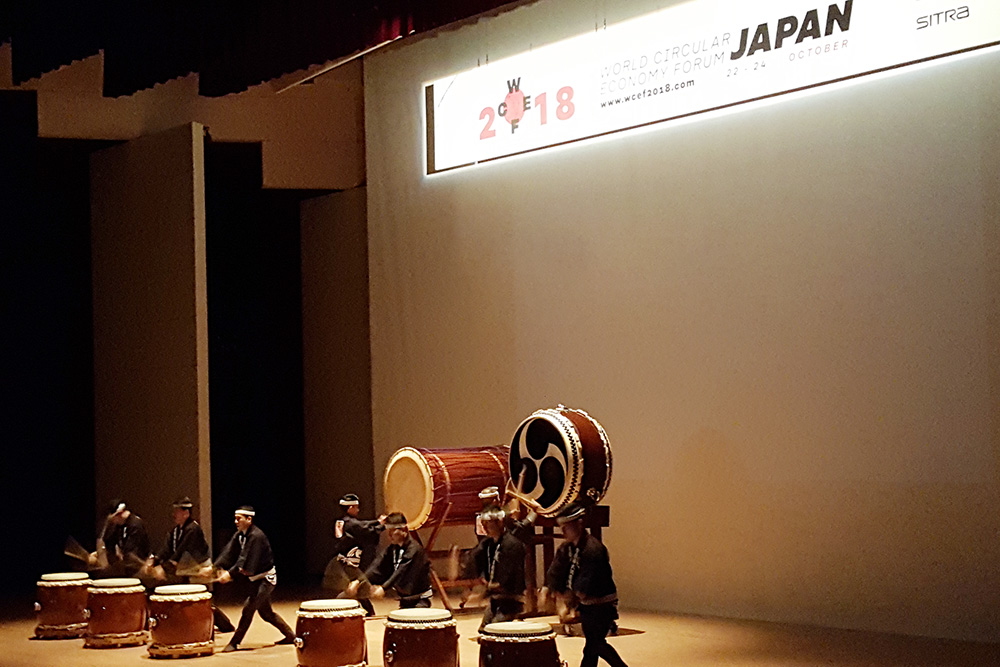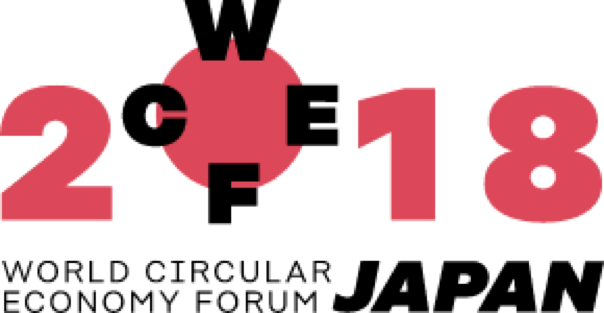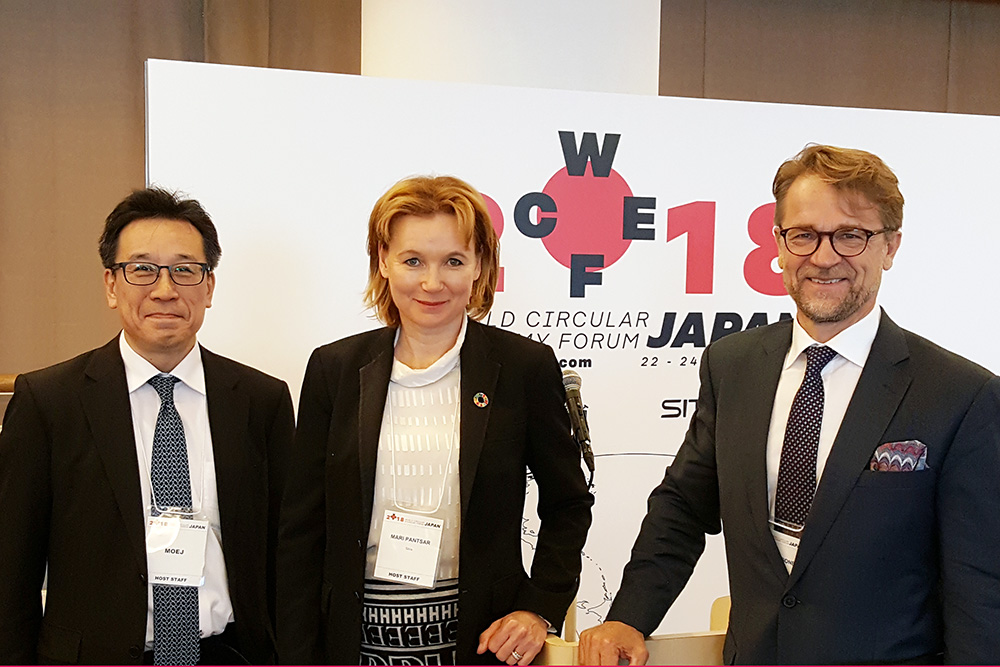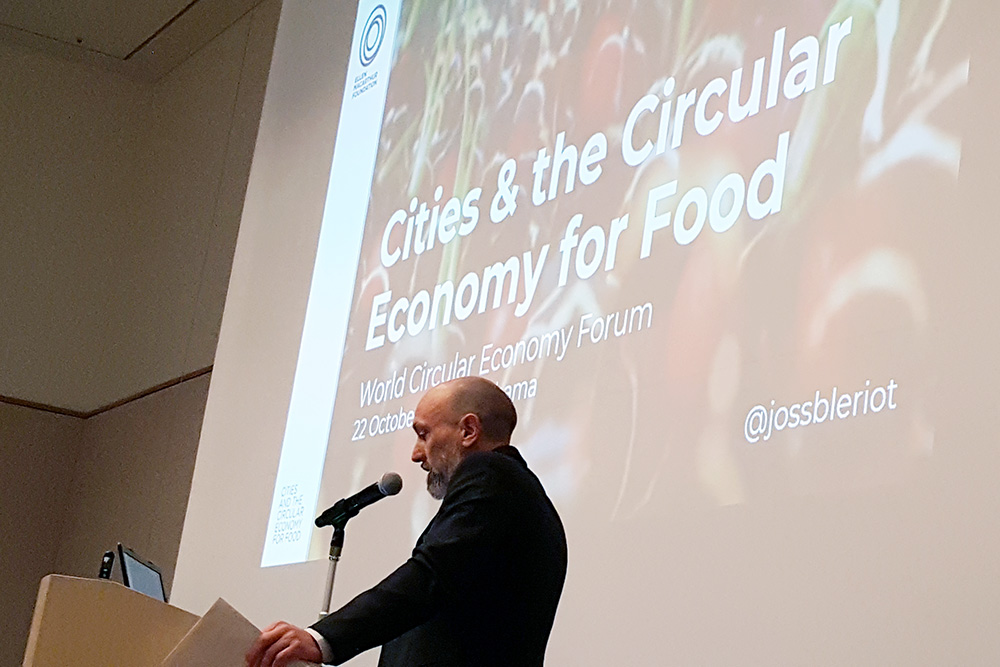About
Participants attended seventeen plenary and parallel sessions with more than one hundred speakers showcasing the best circular economy solutions for business, cities and finance. Sessions examined links between the circular economy and the fourth industrial revolution, food systems, finance and investment, business solutions, lifestyles and consumption, plastics, education, climate change, research and development, rural development, and value chains.
Final report
Summary report 22–24 October 2018
All coverage

 The second World Circular Economy Forum 2018 (WCEF2018) took place from 22-24 October 2018, in Yokohama, Japan. The world’s biggest global gathering on circular economy solutions brought together more than 1,100 leading experts and decision-makers from more than eighty countries to discuss their future visions. The WCEF provides a platform for in-depth consideration of the role that a circular economy can play as a vehicle for de-coupling economic growth from the ecological impact of natural resource consumption and as an important means to meet the challenges of the Sustainable Development Goals (SDGs) and the UN Framework Convention on Climate Change (UNFCCC) Paris Agreement on climate change. Ministers from Finland and Japan attending the Forum described the potential of the circular economy to renew the global economy.The Forum was jointly hosted this year by the Finnish Innovation Fund Sitra and the Ministry of the Environment of Japan (MOEJ). The State Minister of the Environment in Japan, Tsukasa Akimoto, announced that Japan will advance the circular economy when the world’s third biggest economy takes up the presidency of the group of 20 countries (G20) in 2019. The Minister of the Environment in Finland, Kimmo Tiilikainen, announced that Finland’s EU presidency of the EU Council of Ministers in 2019 will be a fantastic opportunity to promote the solutions of circular economy and to fight environmental collapse and climate change.In a video message to participants, the Prime Minister of Japan, Shinzō Abe, explained that his country wished to share its experience of natural resource conservation and take the lead on circular economy within the international community, notably when Japan uses its Presidency of the Group of 20 (G20) in 2019 to raise the related challenges of plastic waste and marine pollution, climate change and biodiversity. The importance of co-operation was highlighted by Jyrki Katainen, Vice-President of the European Commission, who described the circular economy as the “industrial leg of fighting climate change.”Participants attended seventeen plenary and parallel sessions with more than one hundred speakers showcasing the best circular economy solutions for business, cities and finance. Participants attended sessions examining links between the circular economy and the fourth industrial revolution, food systems, finance and investment, business solutions, lifestyles and consumption, plastics, education, climate change, research and development, rural development, and value chains. A series of related meetings, networking opportunities and bilaterals took place in parallel with the WCEF2018, including a number of ministerial engagements. The latter included a signing ceremony for a Memorandum of Cooperation in the field of the Environment to intensify cooperation between the Ministry of the Environment of Japan and the Ministry of the Environment of Finland. Side events continued on Wednesday, 24 October.Sitra initiated and convened the first World Circular Economy Forum (WCEF2017) from 5-7 June 2017 in Helsinki, Finland.Anticipating a background theme in the deliberations in Yokohama, Mikko Kosonen, President, Sitra, reflected on the need for a compelling vision of a desirable future while conceding that the world is passing through a remarkable time of geopolitical turmoil and global environmental challenge. He called on participants not to allow fear of the unknown or change to limit actions for a circular economy.The core messages that emerged from the WCEF 2018 called for immediate action across all countries and regions:The world lacks a shared Circular Economy vision: There was a call for a prosperous future and a globally shared positive long-term circular economy vision. This was identified as a potential foundation to build action-oriented international, national and local strategies with measurable goals as well as inspire grassroots activities. The World Circular Economy Forums were described as platforms to support this work.The SDGs were identified as an excellent basis to build a global Circular Economy strategy which defines a trajectory for advancement by 2030, 2050 and beyond and how to get there. The G20 and UN meetings were identified as ideal decision-making tools to build a global circular economy strategy and together tackle global challenges of climate change, polluted environments and unemployment. The circular economy was said to be an essential part of meeting the Paris Agreement goal of limiting global warming to well below two degrees Celsius, as there is growing recognition that renewable energy and energy efficiency measures alone will not suffice.Circular economy is good for business, trade and job creation: The core messages underlined the need for a shared global vision for a circular economy that can correct current political emphasis on national interests and help remove and prevent harmful obstacles to international trade and collaboration such as trade tariffs and protectionism. Increased trade of knowledge and services combined with local production close to markets were identified as contributions to lowering environmental impact through less required transportation and more efficient supply chains. There was a call for product and service solutions that enable the circular economy to be allowed to spread across global markets freely. Urgent need for stronger leadership and international collaboration: There was a call for collaboration to help build a global circular economy by 2050 and create a planet where the economy and the environment are no longer in contradiction. This was accompanied by a call for strong political and business leadership to shift away from a linear economic paradigm, which was described as the root cause of global challenges such as climate change, polluted environments and unemployment. The key messages from the opening speeches at the WCEF2018 included:
The second World Circular Economy Forum 2018 (WCEF2018) took place from 22-24 October 2018, in Yokohama, Japan. The world’s biggest global gathering on circular economy solutions brought together more than 1,100 leading experts and decision-makers from more than eighty countries to discuss their future visions. The WCEF provides a platform for in-depth consideration of the role that a circular economy can play as a vehicle for de-coupling economic growth from the ecological impact of natural resource consumption and as an important means to meet the challenges of the Sustainable Development Goals (SDGs) and the UN Framework Convention on Climate Change (UNFCCC) Paris Agreement on climate change. Ministers from Finland and Japan attending the Forum described the potential of the circular economy to renew the global economy.The Forum was jointly hosted this year by the Finnish Innovation Fund Sitra and the Ministry of the Environment of Japan (MOEJ). The State Minister of the Environment in Japan, Tsukasa Akimoto, announced that Japan will advance the circular economy when the world’s third biggest economy takes up the presidency of the group of 20 countries (G20) in 2019. The Minister of the Environment in Finland, Kimmo Tiilikainen, announced that Finland’s EU presidency of the EU Council of Ministers in 2019 will be a fantastic opportunity to promote the solutions of circular economy and to fight environmental collapse and climate change.In a video message to participants, the Prime Minister of Japan, Shinzō Abe, explained that his country wished to share its experience of natural resource conservation and take the lead on circular economy within the international community, notably when Japan uses its Presidency of the Group of 20 (G20) in 2019 to raise the related challenges of plastic waste and marine pollution, climate change and biodiversity. The importance of co-operation was highlighted by Jyrki Katainen, Vice-President of the European Commission, who described the circular economy as the “industrial leg of fighting climate change.”Participants attended seventeen plenary and parallel sessions with more than one hundred speakers showcasing the best circular economy solutions for business, cities and finance. Participants attended sessions examining links between the circular economy and the fourth industrial revolution, food systems, finance and investment, business solutions, lifestyles and consumption, plastics, education, climate change, research and development, rural development, and value chains. A series of related meetings, networking opportunities and bilaterals took place in parallel with the WCEF2018, including a number of ministerial engagements. The latter included a signing ceremony for a Memorandum of Cooperation in the field of the Environment to intensify cooperation between the Ministry of the Environment of Japan and the Ministry of the Environment of Finland. Side events continued on Wednesday, 24 October.Sitra initiated and convened the first World Circular Economy Forum (WCEF2017) from 5-7 June 2017 in Helsinki, Finland.Anticipating a background theme in the deliberations in Yokohama, Mikko Kosonen, President, Sitra, reflected on the need for a compelling vision of a desirable future while conceding that the world is passing through a remarkable time of geopolitical turmoil and global environmental challenge. He called on participants not to allow fear of the unknown or change to limit actions for a circular economy.The core messages that emerged from the WCEF 2018 called for immediate action across all countries and regions:The world lacks a shared Circular Economy vision: There was a call for a prosperous future and a globally shared positive long-term circular economy vision. This was identified as a potential foundation to build action-oriented international, national and local strategies with measurable goals as well as inspire grassroots activities. The World Circular Economy Forums were described as platforms to support this work.The SDGs were identified as an excellent basis to build a global Circular Economy strategy which defines a trajectory for advancement by 2030, 2050 and beyond and how to get there. The G20 and UN meetings were identified as ideal decision-making tools to build a global circular economy strategy and together tackle global challenges of climate change, polluted environments and unemployment. The circular economy was said to be an essential part of meeting the Paris Agreement goal of limiting global warming to well below two degrees Celsius, as there is growing recognition that renewable energy and energy efficiency measures alone will not suffice.Circular economy is good for business, trade and job creation: The core messages underlined the need for a shared global vision for a circular economy that can correct current political emphasis on national interests and help remove and prevent harmful obstacles to international trade and collaboration such as trade tariffs and protectionism. Increased trade of knowledge and services combined with local production close to markets were identified as contributions to lowering environmental impact through less required transportation and more efficient supply chains. There was a call for product and service solutions that enable the circular economy to be allowed to spread across global markets freely. Urgent need for stronger leadership and international collaboration: There was a call for collaboration to help build a global circular economy by 2050 and create a planet where the economy and the environment are no longer in contradiction. This was accompanied by a call for strong political and business leadership to shift away from a linear economic paradigm, which was described as the root cause of global challenges such as climate change, polluted environments and unemployment. The key messages from the opening speeches at the WCEF2018 included:
At the final plenary it was announced that WCEF2019 will be hosted again by Finland.
IISD Reporting Services, through its ENB+ Meeting Coverage, provided a summary report from WCEF2018 which is available in HTML and PDF format.

